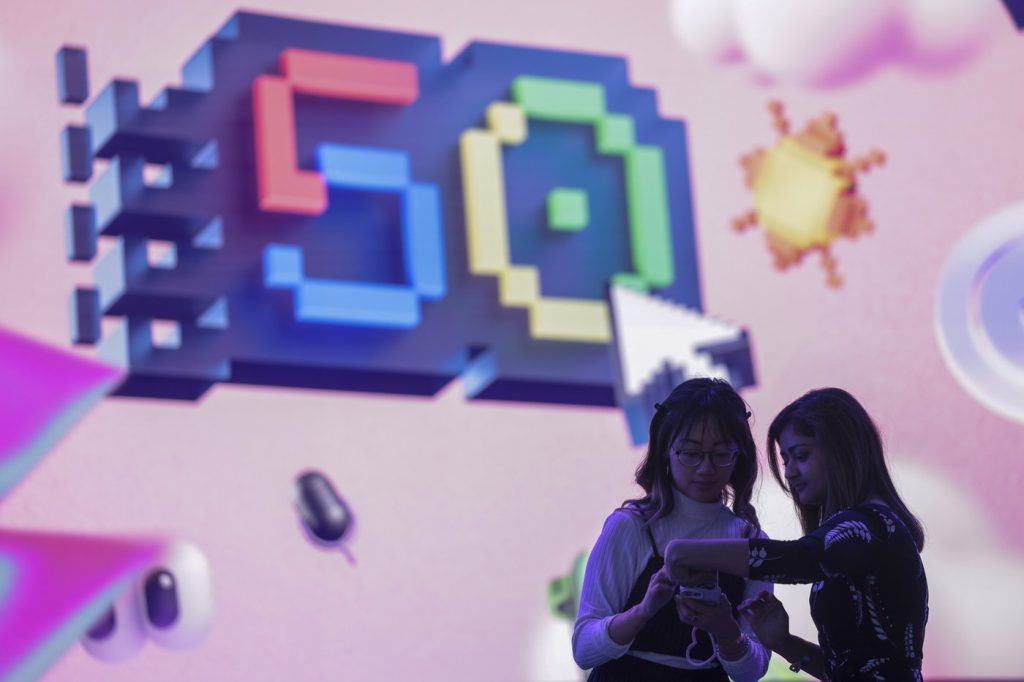Fifty years after the founding of Microsoft, the company’s artificial intelligence division is gearing up to launch a new product line that aims to be as essential to daily life as its previous innovations. Mustafa Suleyman, the CEO of the AI division, envisions a future where everyone has a personalized AI companion that not only learns individual preferences but also adapts its style, appearance, and expression. “This will, over time, have its own name and adapt to you,” Suleyman said in an interview with The Associated Press.
Suleyman unveiled this ambitious vision during Microsoft’s 50th anniversary celebration at its headquarters in Redmond, Washington. This historic event showcased a rare gathering of Bill Gates, co-founder and former CEO, alongside his successors Steve Ballmer and current CEO Satya Nadella. Suleyman, who joined Microsoft just over a year ago, is focused on ensuring the company’s future hinges on the development of robust AI applications, particularly as the rapidly evolving tech landscape presents significant competition.
The flagship product of this AI era is Copilot, which integrates chatbot functionalities within Microsoft’s suite of productivity tools, including Excel and PowerPoint. Suleyman is striving for a more advanced technology that can build a “lasting, meaningful relationship” with users, moving beyond traditional software and aiming for a companion-like experience. “It’s far more than just a piece of software or a tool. It is unlike anything we’ve really ever created,” he remarked.
Some features, such as new “visual memory” capabilities for chatbots that record users' digital interactions if desired, are being launched on mobile apps. However, many additional features are still under development. Suleyman, 40, brings a wealth of experience to Microsoft, having co-founded the Siri-like AI research lab DeepMind, which was acquired by Google in 2014. After leaving DeepMind in 2022 to co-found Inflection AI with Reid Hoffman, Suleyman was later recruited by Microsoft as part of a strategic move that attracted antitrust scrutiny.
In his recent book, “The Coming Wave,” Suleyman discusses the promise of AI and the importance of regulating its potential risks. Unlike other AI laboratories focused on artificial general intelligence (AGI), Suleyman intends to concentrate on creating a true personal AI companion. “The definition of AGI feels very far out to me and is not what I’m focusing on in the next few years,” he stated.
The competition to develop superior AI personal assistants is fierce, with major companies like Google and Meta Platforms restructuring their AI teams. Additionally, OpenAI, which is both a partner and competitor for Microsoft, is adjusting its leadership. Amazon is also advancing its own digital assistant Alexa with enhanced AI capabilities. Suleyman acknowledges the competitive market, stating, “It’s a super competitive market but this is absolutely foundational to us.” He emphasizes that AI solutions for both workplace and home settings represent a major platform shift that Microsoft must capitalize on for long-term success.
Further complicating this pursuit, skepticism persists from investors and large business customers regarding the substantial costs associated with AI technology and its operation. Suleyman shared his own experiences with Copilot, noting the limitations of generative AI, particularly its tendency to make errors—a phenomenon known as hallucinations. He candidly revealed some examples of his interactions with the technology, including an attempt to calculate Microsoft’s total revenue over its 50 years, which yielded an incorrect total. He also recounted more casual conversations, including discussions around cooking and dietary information, showcasing the diverse applications of generative AI.
Microsoft researchers recently published a study highlighting concerns that generative AI might inhibit critical thinking and lead to overreliance by users. While Suleyman disagrees with this conclusion, he underscores that making chatbots fun, useful, and personable is key to gaining acceptance, especially in light of concerns regarding job displacement. He predicts that AI will transform the nature of work, claiming, “Now it’s kind of unimaginable to think that you’re going to have a bunch of agents working for you at the office.”
Suleyman envisions personal AI assistants managing tedious administrative tasks, thus allowing knowledge workers to redirect their focus towards creative aspects of their jobs. He believes that such advancements will bring about unprecedented automation in everyday activities, leading to a more efficient and liberated work-life experience.











